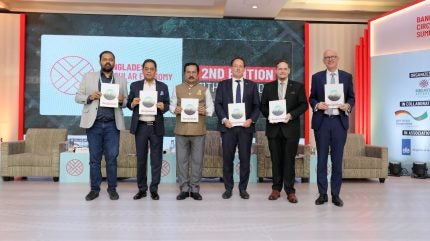
The Bangladesh Circular Economy Summit in Dhaka was organised by the Bangladesh Apparel Exchange (BAE) in collaboration with German development cooperation agency GIZ and in association with the Embassy of the Kingdom of the Netherlands in Bangladesh.
The event spotlighted the importance and ways of transitioning from a linear economic model to one that prioritises resource efficiency and waste reduction.
The summit began with an inaugural ceremony, followed by four insightful plenary sessions, three engaging panel discussions, and an innovative breakout session. Through these platforms, participants explored strategies to accelerate the adoption of circular practices within Bangladesh’s apparel and textile industries.
Chief guest H.E. Jahangir Kabir Nanak, Honorable Minister for Textiles & Jute, Government of the People’s Republic of Bangladesh said the Bangladesh apparel industry has come a long way in terms of sustainability.
“For the development of our country, it largely depends on the apparel and textile industry. There have been tremendous safety improvements in the industry. The country’s apparel industry is taking a lead in responsible business. While we are going forward, we need to ensure it is sustainable. Collaboration will be key for circularity and progress.”
“We have only one earth. It is our responsibility to protect it also for our future generation. We have to ensure optimum use of our resources.”
Siddiqur Rahman, former BGMEA president added: “Collaboration between brands and manufacturers is very important to promote circular fashion. We are your partners. I’m requesting all brands, please increase your price a little. Otherwise, we cannot survive.
“Bangladesh has come a long way in circularity and sustainability. The journey of our industry was not smooth. We overcame every challenge. Our industries maintain the highest standards. The apparel entrepreneurs are adopting sustainable practices and there are more than 200 certified green garments and more than 500 are awaiting certifications. Bangladesh is also focusing on a circular economy by reducing materials use and focusing more on recycling. We require support from the developed countries for know-how and technology sharing on circularity. Bangladesh is a sustainable and reliable partner.”
Meanwhile, Thijs Woudstra, deputy head of mission, Embassy of the Kingdom of the Netherlands in Bangladesh commented: “To move one step forward towards circularity, we need to extensively and contextualise the ways to integrate robust visibility systems throughout the supply chain. This will ensure the formation and quality of materials, meeting the regulations and consumer demand for increased transparency from environmental factors.
“The garments industry of Bangladesh are a powerhouse. By working together, we can unlock the potential of circularity in the economy.”
And Jan Janowski, deputy head of mission, Embassy of Germany in Bangladesh urged Bangladesh to think about more ambitious reforms.
“Certainly, businesses are often leading the way as pioneers in different sectors. But of course, institutions, governments, and cities also play a very crucial role in creating and enabling the conditions for a circular economy. They can set the direction and they can also be the drivers of innovation and investment.
“Investing in sustainable production of the circular industries is not only a responsible business decision but also a strategic one that can position Bangladesh further as a leader in sustainable manufacturing and enable industries to play in the global marketplace including Germany and the EU.”
Bangladesh Apparel Exchange founder & CEO Mostafiz Uddin hailed the improvements made by the apparel and textile sectors in Bangladesh. But he urged more to get on board to help the country become a leader in the sustainability and circularity space.
He said: “Our government, private sectors, partners, and all stakeholders are working hard towards a shared vision. The change starts from you and me. We all have a big role to achieve a collective vision for Bangladesh.”



